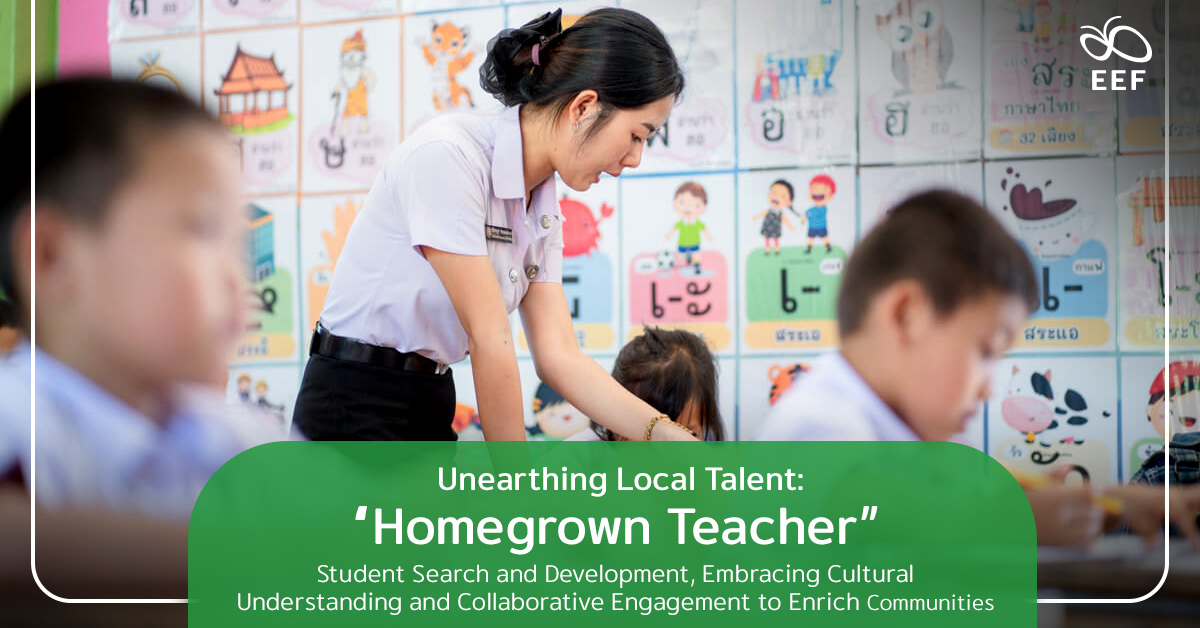
The quest for “Homegrown Teacher” students defines the eponymous initiative’s mission centered on cultivating a new generation of teachers deeply rooted in their communities — ones where they return to serve upon the completion of their education. Through a teacher production system collectively propelled by local educational institutions and communities, the initiative strives to uncover and nurture “developer-teachers” equipped with both educational skills and a profound understanding of their local contexts. These emerging educators, empowered to collaborate with their respective communities, are anticipated to play a vital role in addressing community challenges without compromising on their unique cultural identities.
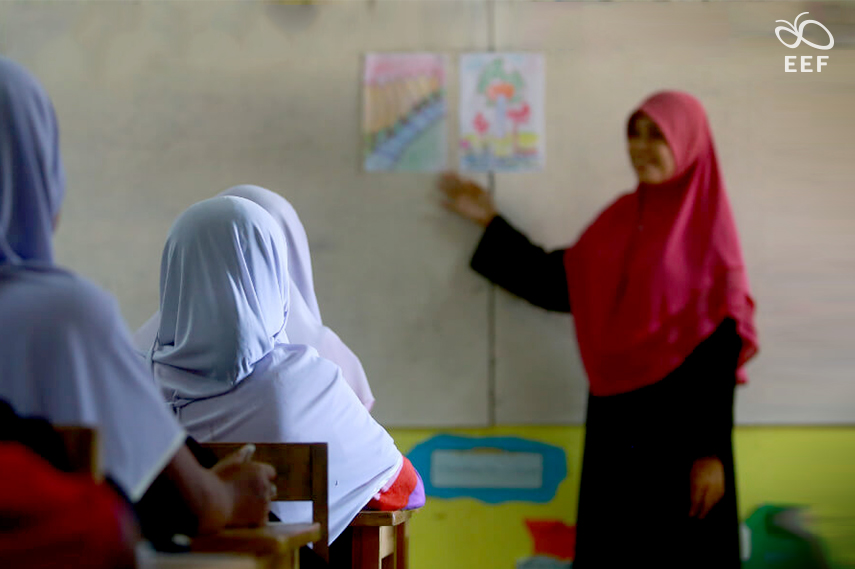
In the culturally diverse region of lower Southern Thailand, where even within the same district, various religious communities harmoniously coexist, the roots of the Homegrown Teacher initiative delve deep, sowing a seed awaiting to be reaped. Nourished by a dynamic learning environment, enriched by a substantial number of students in the program, mutual learning flourishes among homegrown teacher students. Leading this charge is Prince of Songkla University’s Pattani Campus, strategically tackling the scarcity of qualified teachers in small-sized schools within the region. The campus adopts a dual focus: refining the student search and selection process and crafting a culturally diverse curriculum tailored to support small-sized schools in diverse contexts.
Embarking on the quest for homegrown teachers, Prince of Songkla University fundamentally reshapes the very role of educational institutions through on-site exploration. The involvement in the selection process transcends the conventional emphasis on academic excellence; it extends to encompass considerations of exemplary conduct, financial prudence, and the potential for outstanding teaching. This transformative shift from being mere consumers to producers of teachers underscores the university’s proactive engagement in curriculum development. The curricular framework is meticulously designed to meet the distinctive requirements of specific regions and remains adaptable to the diverse class structures found within small-sized schools.
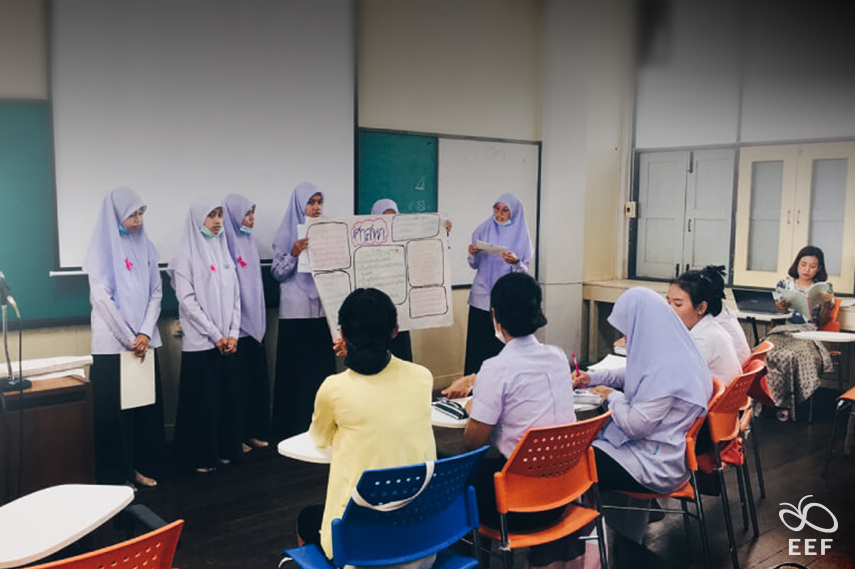
In tandem with the university’s endeavors, communities assume a pivotal role in shaping the development of homegrown teachers. A team of proficient professors, specializing in language, religion, and diverse social contexts, meticulously orchestrates this collaborative effort. Students, guided by this expert team, immerse themselves in the intricacies of their prospective teaching environments. The focus is particularly on local wisdom, prompting the tailoring of courses to suit the unique context of each community. This immersive experience involves ongoing research and sustained community engagement throughout the comprehensive four-year study period. The synergy between students and communities is paramount, with the establishment of a network serving as a catalyst to propel the project forward.
Notably, within the local framework of Prince of Songkla University’s transformative initiative, the incorporation of the local Yawi language stands out as a pivotal strategy. This authentic linguistic bond, intricately interwoven into the very fabric of the communities’ daily life, serves as a powerful symbol of the genuine collaborative endeavors propelling the university’s dedication to fostering community development with a profound and enduring perspective. The ultimate goal of this transformative initiative resonates unmistakably —the holistic development of individuals within their respective communities, a testament to the commitment and dedication intricately interwoven into its very fabric.
It is imperative to recognize that Prince of Songkla University’s initiative is not an isolated effort but a crucial part of the overarching eponymous Homegrown Teacher initiative initiated by the Equitable Education Fund (EEF) Thailand. This collective endeavor proves the veracity of the adage “the whole is greater than the sum of its parts.” The impact of this initiative extends beyond local boundaries, instigating policy and system changes not only at the grassroots level but also reverberating at the national level.
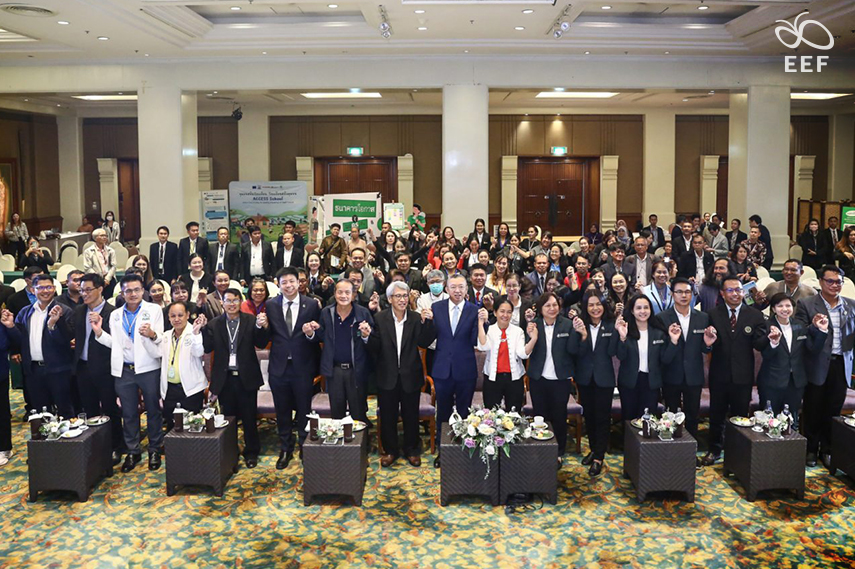
Transitioning from the localized focus of the Homegrown Teacher initiative, a broader perspective unfolded on the national stage at the “Elevating the Quality of Remote Small-Sized Schools: Equitable Education Is Possible” forum. This pivotal gathering saw directors and teachers from small-sized schools across the country converging to confront the myriad challenges faced by standalone or protected schools. These schools, comprising almost half of the country’s educational institutions and serving nearly one million students, are uniquely situated on mountains or islands, numbering around 1,500.
Compelled by Cabinet resolutions, these small-sized schools find themselves unable to merge, as no other school exists within a 6-kilometer radius. Consequently, they stand as sole beacons of education in their respective areas — yet in desperate need of care and support. The forum becomes a platform where the collective focus shifts towards a myriad of proposals and strategies meticulously crafted to secure the future of these small-sized schools, irrespective of their protected or non-protected status. This underscores the importance of a collective responsibility cutting across all sectors to ensure the thriving success of these educational sanctuaries.
Addressing the critical challenge of insufficient and unqualified teachers, the Homegrown Teacher initiative has emerged as a strategic and transformative solution. Local individuals aspiring to become community teachers are not merely recruited but also equipped through comprehensive training programs. Committed to their respective communities, these individuals pledge to return and serve in their respective areas, ensuring a sustainable impact. The first cohort, comprising 327 homegrown teachers, will be strategically dispersed to 284 schools in remote areas, spanning 224 sub-districts across 44 provinces in the academic year 2024. Over the subsequent five years, the initiative aims to produce a substantial pool of over 1,500 homegrown teachers, marking a significant stride in mitigating human resource disparities. This collaborative effort extends its reach to all 19 teacher training and development institutions nationwide. After their appointment, these institutions will provide support to these teachers in their respective communities for the next 6 years.
Shifting the lens to the fiscal domain, the prevalent funding model based on student numbers accentuates budgetary disparities for small-sized schools. Proposed adjustments involve a meticulous revision of budget allocation formulas, integrating considerations for distance and compensating for schools situated in remote locations. Notably, drawing inspiration from successful trials in Ratchaburi, an alternative model termed “Fundamental School Quality Level (FSQL)” has been introduced to effectively harness donated funds for school upgrades. These proposed budget reforms not only aim for fiscal equilibrium but also underscore a commitment to equitable distribution, covering a substantial portion of the Ministry of Education’s budget.
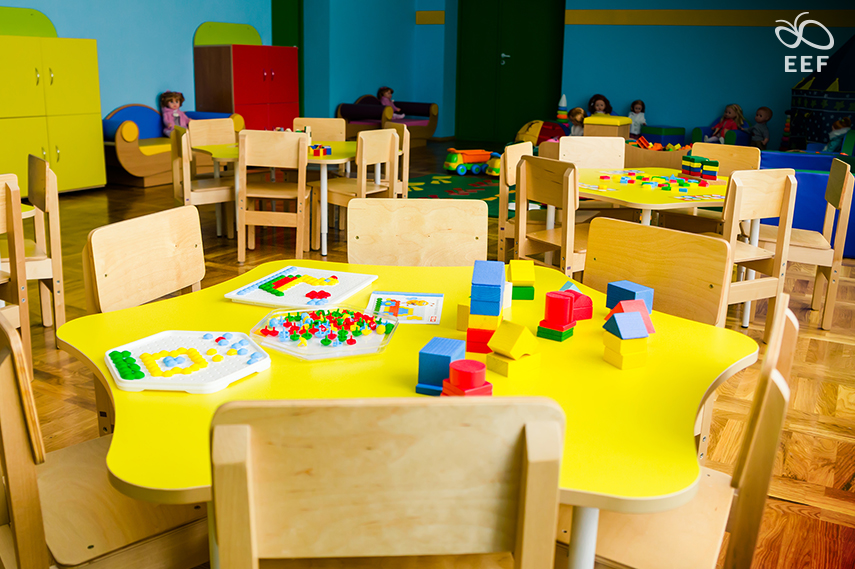
In the realm of teaching innovation, the imperative for small-sized schools is underscored. Implementing a “Multi-Age Classroom” system, where students of varying ages share a class, emerges as a pragmatic solution to address teacher shortages. Simultaneously, embracing cutting-edge technology becomes a catalyst for enhancing the overall learning experience. Establishing “Smart Classrooms” and championing technology integration signals a progressive and forward-looking approach to education. This transformative shift creates dynamic and engaging learning environments, aligning with the evolving educational landscape.
Community engagement unfolds under the banner of the “All for Education” initiative, seamlessly aligning with government education policies. A collaborative synergy between communities and educational institutions takes center stage, aiming to co-create a shared vision for quality education. Vital to this collective effort is the encouragement of community involvement in school management, exemplified by positive instances in Ratchaburi and other provinces. This unified endeavour catapults the dream of providing quality education to the forefront, transforming it into a tangible reality for generations to come.
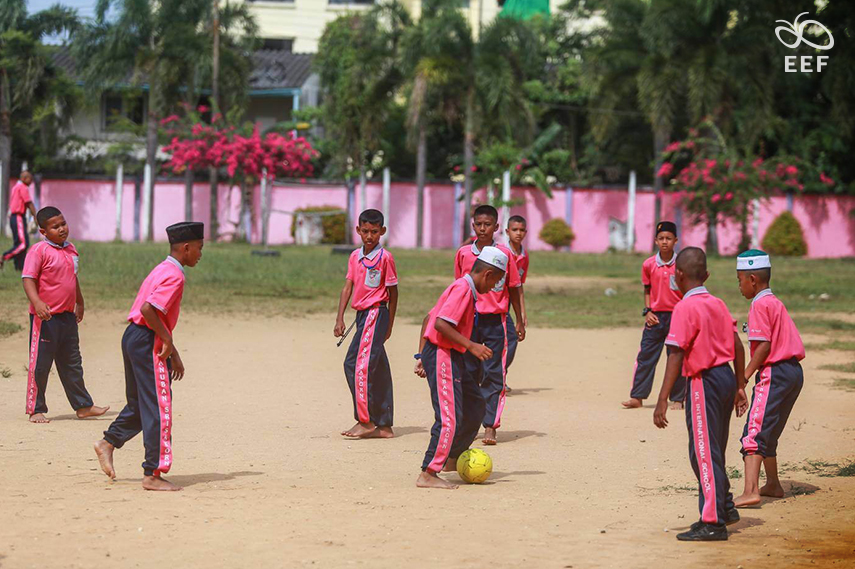
The potential for continuous growth in individuals within communities, irrespective of age, becomes undeniable. To catalyze a transformative impact in standalone small-sized schools, collaboration emerges as the linchpin to redefine their roles and shape the future of the educational sector. Transforming these schools into lifelong learning centers for their respective communities, fostering life and professional skills at every stage of life, aligns seamlessly with the recently enacted Lifelong Learning Promotion Act of 2023 by the Department of Learning Encouragement, which is ambitiously expanding its operational scope.
Shifting the focus to encompass learning at all stages of life not only invites various organizations to contribute support to these standalone small-sized schools but also necessitates a profound revision of regulations. This revision extends beyond teaching methods to encompass the broader mission that educators undertake. Insights from field visits reveal a latent desire among local leaders to allocate local funds to schools. However, bureaucratic hurdles, exemplified by inspections from the State Audit Office of the Kingdom of Thailand demanding fund refunds, hinder these aspirations. Many have undertaken the arduous responsibility of navigating these bureaucratic processes. The expeditious realization of this process hinges on the adjustment of regulations and related rules, allowing ministries to directly allocate funds to support these standalone small-sized schools. However, navigating through various administrative layers beyond the municipal level poses a formidable challenge, potentially taking years to complete.
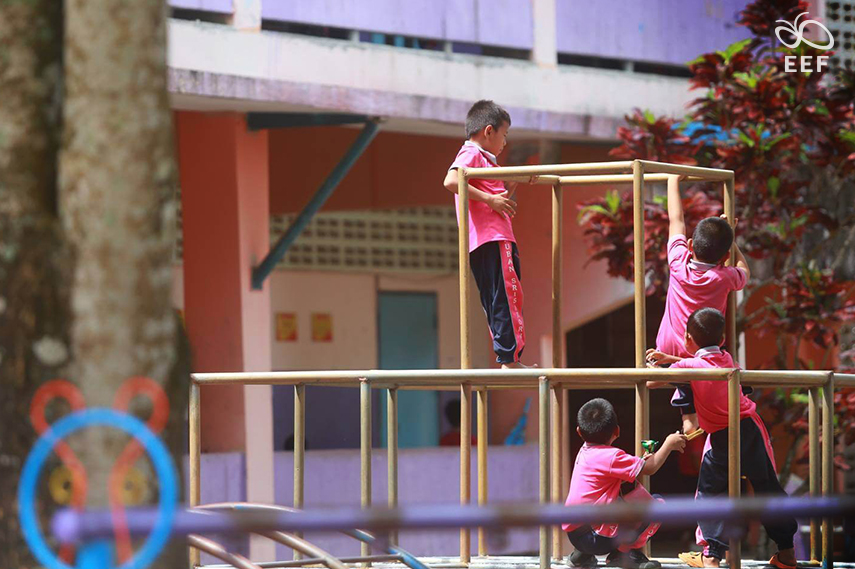
These multifaceted proposals strategically aim to secure the future of small-sized schools, irrespective of their protected or non-protected status. Past endeavors underscore that certain communities possess the resilience to turn challenges into opportunities, thereby creating knowledge that reverberates within their respective communities. The collective responsibility embedded in the focus on education offers an unprecedented opportunity for all sectors to collaboratively support small schools, facilitating their thriving and flourishing in the educational landscape.
In essence, the EEF’s Homegrown Teacher initiative transcends education; it embodies community-driven transformation. Taking roots in various localities, it cultivates educators deeply tied to their roots, blending local engagement, innovative curricula, and community collaboration. Aligned with the EEF’s vision, the initiative forges “developer-teachers” seamlessly integrated into communities, addressing teacher shortages and fostering holistic development. This collective journey does not just tackle educational challenges; it shapes the societal fabric, envisioning a future where education empowers communities. As the initiative unfolds, it underscores the EEF’s commitment to reducing education inequality through research, collaboration, and support for children, youth, and adults in need, leaving lasting impacts that resonate nationwide with transformative community-centric education.

